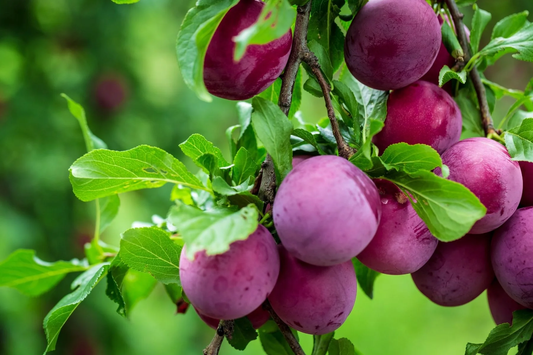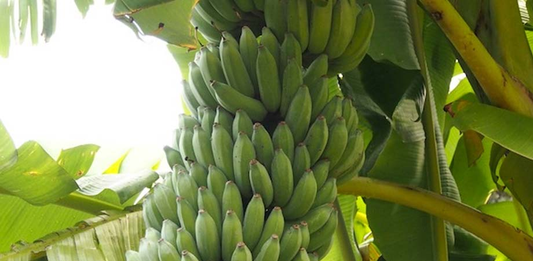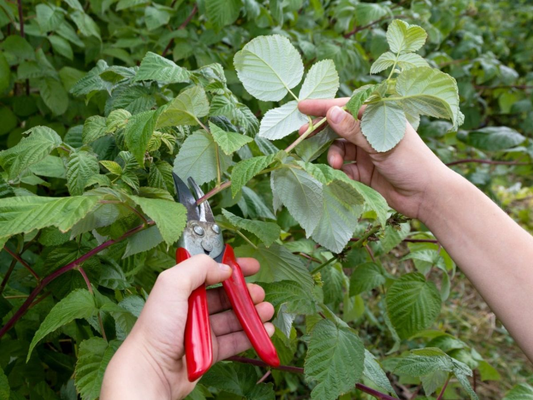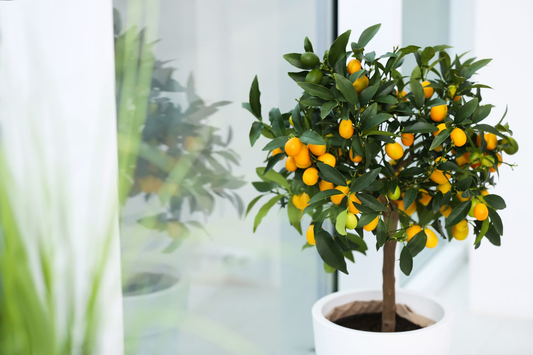5 Reasons to Buy Organic Vegetable Seeds for a Healthier Harvest
Share
Table of Contents
1. Introduction
Organic gardening is more than just a trend; it's a sustainable lifestyle choice that promotes health and environmental well-being. By growing your own food or purchasing organic produce, you support farming practices that are free from synthetic pesticides and fertilizers. Organic gardening emphasizes working in harmony with nature, which leads to healthier ecosystems and more nutritious food. As more people become aware of the benefits of organic products, the demand for organic seeds has increased significantly.
Choosing quality seeds is a crucial step in establishing a successful garden. Quality seeds not only determine the health and yield of your plants but also influence the flavor and nutritional value of the produce you harvest. When you opt for organic vegetable seeds, you ensure that you’re starting with plants that are:
- Free from genetically modified organisms (GMOs)
- Grown using sustainable practices
- Adapted to local growing conditions
Buying organic vegetable seeds comes with a multitude of benefits, including:
- Healthier produce: Organic vegetables tend to have higher nutrient levels and lower pesticide residues.
- Environmental benefits: Organic farming practices contribute to soil health and biodiversity.
- Support for local economies: Purchasing organic seeds often means supporting local farmers and businesses.
- Enhanced flavor: Many gardeners report that organic vegetables taste better than their conventional counterparts.
- Diverse varieties: Organic seed catalogs often feature heirloom and rare varieties that can add unique flavors to your meals.
In this article, we will delve deeper into the five compelling reasons why buying organic vegetable seeds is a smart choice for your health, the environment, and your culinary adventures.

2. Reason 1: Health Benefits of Organic Produce
Organic farming practices prioritize the health of the soil, plants, and ecosystems. By adhering to these practices, organic farmers cultivate crops without the use of synthetic fertilizers, pesticides, or herbicides. Instead, they utilize natural methods that promote biodiversity and soil fertility. Some key organic farming practices include:
- Crop rotation: Alternating the types of crops grown in a specific area to improve soil health and reduce pest buildup.
- Composting: Using decomposed organic materials to enrich the soil, providing essential nutrients to plants.
- Biological pest control: Encouraging beneficial insects and using natural repellents to manage pests without harmful chemicals.
- Cover cropping: Planting cover crops to protect and enrich the soil between main crops.
These methods not only protect the environment but also contribute to the nutritional profile of the produce. Studies have shown that organic vegetables often contain higher levels of certain nutrients compared to conventionally grown ones. The nutritional advantages of organic vegetables include:
- Higher Antioxidant Content: Organic vegetables generally have more antioxidants, which help combat oxidative stress in the body.
- Increased Vitamins and Minerals: Organic farming methods can lead to higher concentrations of vitamins, such as vitamin C and certain B vitamins.
- Better Flavor: Many gardeners and chefs attest that organic vegetables offer superior flavor due to the natural growing conditions and nutrient-rich soil.
The health impacts of consuming organic produce are significant, particularly in terms of reduced pesticide exposure. Conventional farming methods often involve heavy use of synthetic chemicals that can leave residues on fruits and vegetables. These residues can pose health risks, especially for vulnerable populations such as children, pregnant women, and individuals with compromised immune systems. By choosing organic vegetable seeds and produce, you are:
- Minimizing your exposure to harmful chemicals
- Supporting safer farming practices that prioritize health and well-being
- Contributing to a cleaner environment by reducing chemical runoff into waterways
In addition to reduced pesticide exposure, organic vegetables are often fresher, as they are typically grown closer to home and sold directly to consumers. This freshness contributes to their enhanced taste, making organic produce not only a healthier choice but also a more enjoyable one.
Overall, the health benefits of organic produce are clear. By buying organic vegetable seeds, you are making a conscious decision to improve your health and the environment. These benefits extend beyond individual health, influencing the broader community and ecosystem. In the next section, we will explore how organic gardening contributes to environmental sustainability.

3. Reason 2: Environmental Sustainability
Organic farming is rooted in the principles of sustainability, aiming to create a harmonious relationship between agriculture and the environment. One of the primary benefits of organic farming is its positive impact on the environment. By avoiding synthetic chemicals and adopting natural farming practices, organic farming promotes a healthier ecosystem. Some of the key ways organic farming benefits the environment include:
- Reduced Chemical Runoff: Organic farms use natural fertilizers and pest management strategies, significantly decreasing the risk of harmful chemicals contaminating nearby waterways.
- Enhanced Soil Health: Organic practices like crop rotation, cover cropping, and composting improve soil structure and fertility, promoting long-term productivity without degrading the land.
- Conservation of Water: Organic farming techniques often result in better water retention in the soil, reducing the need for irrigation and minimizing water waste.
A cornerstone of organic farming is the promotion of biodiversity. Biodiversity is essential for a healthy ecosystem, providing resilience against pests and diseases. The importance of biodiversity in organic farming includes:
- Natural Pest Control: A diverse range of plants and insects helps to create a balanced ecosystem where beneficial insects can control pest populations naturally.
- Soil Microbial Diversity: Organic farming encourages a variety of microorganisms in the soil, which contribute to nutrient cycling and overall soil health.
- Crop Resilience: Biodiverse ecosystems are more resilient to environmental stresses such as drought or disease, ensuring food security in changing climates.
Soil health is another critical component of sustainable agriculture. Healthy soils are the foundation of productive farming and contribute to environmental sustainability in numerous ways:
- Carbon Sequestration: Healthy soils can store carbon, helping to mitigate climate change by reducing greenhouse gases in the atmosphere.
- Nutrient Cycling: Organic practices enhance the natural cycling of nutrients in the soil, providing plants with essential nutrients without the need for synthetic fertilizers.
- Prevention of Erosion: Organic farming methods improve soil structure, reducing erosion and promoting water infiltration, which is vital for sustaining agriculture.
The long-term effects of organic gardening on ecosystems are profound. By adopting organic practices, gardeners contribute to a healthier environment, with benefits that extend beyond their own gardens:
- Habitat Preservation: Organic farms can serve as habitats for wildlife, including pollinators and beneficial insects, promoting ecological balance.
- Enhanced Food Quality: Healthier soils lead to more nutrient-dense produce, contributing to improved food quality for consumers.
- Community Health: Organic gardening promotes a culture of sustainability, inspiring communities to engage in environmentally friendly practices and fostering a connection to nature.

4. Reason 3: Supporting Local Farmers and Communities
Supporting local farmers and communities is a significant benefit of purchasing organic vegetable seeds. Organic seed companies play a vital role in local economies by providing farmers with quality seeds that adhere to sustainable practices. The following points highlight the role of organic seed companies in bolstering local economies:
- Job Creation: Local organic seed companies create jobs within the community, from seed production to distribution and retail.
- Economic Stability: By supporting local seed businesses, consumers help foster economic stability, reducing reliance on large agricultural corporations.
- Community Investment: Profits from local seed companies are often reinvested in the community, supporting schools, local initiatives, and infrastructure.
When you buy organic seeds, you are not just purchasing a product; you are investing in sustainable farming practices. Supporting organic seed companies helps maintain and promote methods that are environmentally friendly and socially responsible. Here are some ways buying organic seeds supports sustainable farming practices:
- Encouragement of Organic Certification: Purchasing organic seeds supports farmers who commit to organic certification, promoting a higher standard of agricultural practices.
- Access to Sustainable Resources: Organic seed companies often provide resources and education to farmers, helping them adopt sustainable practices that enhance productivity without harming the environment.
- Promotion of Crop Diversity: Organic seed companies often offer a variety of heirloom and rare seed varieties, encouraging crop diversity that can lead to healthier ecosystems.
The impact of local purchasing on community resilience cannot be overstated. By choosing to buy organic vegetable seeds from local sources, consumers contribute to the overall well-being of their communities. Some key impacts include:
- Strengthened Local Economy: Keeping dollars within the community enhances economic resilience, allowing local businesses to thrive and grow.
- Reduced Carbon Footprint: Purchasing locally reduces transportation emissions, contributing to a smaller carbon footprint and supporting environmental sustainability.
- Enhanced Food Security: Local food systems contribute to food security by providing fresh produce directly to consumers, reducing reliance on distant suppliers.
Additionally, supporting local farmers fosters a sense of community. When consumers purchase organic seeds and produce from nearby sources, they build relationships with farmers and gain a better understanding of the food system. This connection can lead to:
- Greater Transparency: Consumers gain insight into farming practices, understanding how their food is grown and harvested.
- Community Engagement: Local farmers often participate in community events, farmers' markets, and educational programs, fostering a sense of belonging and engagement.
- Shared Knowledge: Interactions between farmers and consumers lead to the exchange of knowledge about sustainable practices and gardening techniques, benefiting both parties.

5. Reason 4: Better Flavor and Quality
One of the most compelling reasons to buy organic vegetable seeds is the superior flavor and quality of the produce they yield. Many gardeners and consumers alike have noted a distinct difference in taste between organic and conventionally grown vegetables. This section will explore the flavor profiles of organic versus conventional produce, share personal experiences or testimonials, and highlight the importance of quality in home gardening.
When comparing the flavor profiles of organic and conventional vegetables, several factors come into play:
- Growing Practices: Organic vegetables are typically grown using natural fertilizers and pest management techniques, which enhance their flavor and nutrient content.
- Soil Health: Organic farming emphasizes soil health, resulting in more nutrient-rich vegetables. Healthier soil leads to better-tasting produce.
- Varietal Differences: Organic farmers often cultivate heirloom varieties, known for their robust flavors, which may not be available in conventional farming.
Numerous studies and anecdotal evidence support the notion that organic vegetables taste better. For example, a taste test conducted by a university found that participants consistently rated organic tomatoes higher in flavor compared to their conventional counterparts. Some personal experiences and testimonials from gardeners and chefs include:
- Home Gardener Testimony: A local gardener reported that her home-grown organic peppers had a “sweet and vibrant taste” compared to store-bought ones that tasted bland.
- Chef Endorsement: A renowned chef noted that the organic heirloom tomatoes he uses in his dishes provide a rich, sweet flavor that enhances his culinary creations.
- Family Favorites: Families who grow their own organic vegetables often comment on how their children prefer the taste of homegrown carrots over the conventional ones, leading to healthier eating habits.
The quality of vegetables harvested from organic seeds is another crucial aspect that contributes to the overall gardening experience. High-quality produce is essential in home gardening for several reasons:
- Health Benefits: Organic vegetables are free from synthetic chemicals and pesticides, making them a healthier choice for families.
- Longer Shelf Life: Organic produce tends to have a longer shelf life due to the absence of preservatives, allowing for longer enjoyment of your harvest.
- Visual Appeal: Organic vegetables often have vibrant colors and natural shapes, enhancing the visual appeal of meals and dishes.
In addition to flavor and quality, growing your own organic vegetables provides a sense of satisfaction and connection to the food you eat. When you tend to your garden and nurture your plants, you develop an appreciation for the effort that goes into producing quality food. This connection can lead to:
- Enhanced Culinary Creativity: With fresh, flavorful ingredients at your fingertips, you’re more likely to experiment with new recipes and cooking techniques.
- Increased Family Bonding: Gardening can be a family activity, allowing families to spend quality time together while cultivating healthy habits.
- A Sustainable Mindset: Growing your own organic vegetables fosters a sustainable mindset, encouraging you to think critically about your food choices and their impact on the environment.

6. Reason 5: Variety and Uniqueness
One of the most exciting aspects of buying organic vegetable seeds is the vast diversity and uniqueness they offer. Organic gardening allows you to explore a wide range of vegetables, including heirloom varieties and unusual cultivars. This section will discuss the diversity of organic vegetable seeds available, what to look for in heirloom and unique varieties, and the benefits of growing uncommon vegetables for culinary exploration.
The diversity of organic vegetable seeds is astounding. Unlike conventional seed options, which often focus on a few high-yield varieties, organic seeds encompass a broad spectrum of plants. Here are some key points about this diversity:
- Wide Range of Choices: Organic seed catalogs often feature hundreds of varieties, from traditional staples to rare gems.
- Adaptation to Local Conditions: Many organic seeds are bred to thrive in specific climates, allowing gardeners to choose varieties that are well-suited to their growing conditions.
- Flavor Profiles: With diverse options available, gardeners can select vegetables that offer unique flavor profiles, enhancing their culinary experiences.
When exploring heirloom and unique varieties, there are several factors to consider. Heirloom seeds are open-pollinated, meaning they can be saved and replanted year after year. Here’s what to look for:
- History and Heritage: Heirloom varieties often have fascinating stories behind them, connecting gardeners to agricultural history.
- Flavor and Quality: Many heirloom varieties are prized for their exceptional flavor and quality, often outperforming modern hybrids in taste.
- Seed Saving Potential: Heirloom seeds can be saved and replanted, creating a sustainable gardening practice that preserves biodiversity.
In addition to heirlooms, there are many unique vegetable varieties worth exploring. These may include:
- Uncommon Colors: Vegetables like purple carrots, blue potatoes, and striped tomatoes can add visual interest to your garden and plate.
- Rare Flavors: Unique varieties such as the candy-striped beet or black zucchini offer distinctive tastes that can elevate your culinary creations.
- Exotic Textures: Some lesser-known vegetables, like kohlrabi or Romanesco, introduce new textures to dishes, encouraging culinary creativity.
Growing uncommon vegetables not only diversifies your garden but also opens up a world of culinary exploration. Here are some benefits of incorporating unique varieties into your gardening and cooking:
- Culinary Creativity: Uncommon vegetables inspire you to try new recipes and cooking methods, expanding your culinary repertoire.
- Freshness and Flavor: Unique vegetables often taste better when harvested fresh from your garden, making your meals more enjoyable.
- Conversation Starters: Unique varieties can impress guests at gatherings, providing a fun way to share your gardening experiences and cooking endeavors.
Furthermore, growing a variety of vegetables can contribute to a healthier diet. By incorporating uncommon vegetables into your meals, you introduce new nutrients and flavors. Some additional benefits include:
- Nutritional Diversity: Unique vegetables often contain different vitamins and minerals, promoting a well-rounded diet.
- Encouragement of Healthy Eating: The excitement of growing and cooking with unique produce can motivate you and your family to try new and healthier foods.
- Connection to Sustainability: Growing diverse crops contributes to biodiversity in your garden and helps sustain local ecosystems.
7. How to Choose the Right Organic Vegetable Seeds
Choosing the right organic vegetable seeds is crucial for a successful gardening experience. Several factors influence this decision, including climate, soil type, and personal preferences. This section will outline these considerations, provide tips for selecting reputable sources for organic seeds, and emphasize the importance of reading seed labels and certifications.
Here are some key factors to consider when selecting organic vegetable seeds:
-
Climate:
- Choose varieties that are well-suited to your local climate and growing conditions.
- Consider the length of your growing season and select seeds accordingly.
-
Soil Type:
- Test your soil to determine its pH and nutrient levels.
- Select seeds that thrive in your soil conditions (e.g., sandy, loamy, or clay).
-
Personal Preferences:
- Consider the vegetables you and your family enjoy eating.
- Explore unique or heirloom varieties that pique your interest.
When sourcing organic seeds, it's essential to select reputable suppliers. Here are some tips for finding trustworthy sources:
-
Research Seed Companies:
- Look for companies that specialize in organic seeds and have a good reputation.
- Read reviews from other gardeners to gauge the quality of their seeds.
-
Visit Local Nurseries:
- Support local businesses that offer organic seeds specific to your region.
- Ask for recommendations from experienced gardeners in your community.
Understanding the importance of seed labels and certifications is also crucial. Here’s why:
-
Seed Labels:
- Look for labels indicating the seeds are certified organic, ensuring they meet organic standards.
- Check for information on germination rates and planting instructions.
-
Certifications:
- Choose seeds that have been certified by reputable organizations to guarantee quality.
- Familiarize yourself with certification logos to make informed choices.
8. Conclusion
In summary, buying organic vegetable seeds offers a multitude of benefits that can significantly enhance your gardening experience and overall health. By opting for organic seeds, you are not only choosing produce that is free from harmful pesticides and chemicals but also supporting sustainable farming practices and local communities. The health benefits of organic vegetables, their superior flavor and quality, and the diversity of unique varieties available make organic gardening an appealing choice for both novice and experienced gardeners.
Starting your own organic garden is an exciting journey that allows you to connect with nature, cultivate fresh produce, and enjoy the satisfaction of growing your own food. Whether you have a spacious backyard or a small balcony, there are numerous ways to create a thriving organic garden tailored to your space and preferences. As you embark on this adventure, remember that every small step contributes to a healthier lifestyle and a more sustainable planet.
Ready to get started? Visit my store for a selection of high-quality organic vegetable seeds that will help you cultivate a flourishing garden. Explore our diverse range of options and find the perfect seeds to kickstart your organic gardening journey today!
9. Frequently Asked Questions (FAQ)
Here are some common questions about organic vegetable seeds that can help you better understand their significance and benefits:
-
What are organic vegetable seeds?
Organic vegetable seeds are seeds that have been produced without the use of synthetic pesticides, fertilizers, or genetically modified organisms (GMOs). They come from plants that are grown in compliance with organic farming standards, promoting sustainable and environmentally friendly practices.
-
How do organic seeds differ from conventional seeds?
Organic seeds are cultivated using natural methods, while conventional seeds may be treated with chemicals or genetically engineered. Organic seeds promote biodiversity and soil health, whereas conventional seeds often prioritize high yields and disease resistance through synthetic means.
-
Are organic vegetable seeds more expensive?
Organic vegetable seeds can be more expensive than conventional seeds due to the higher costs associated with organic farming practices, such as certification and sustainable methods. However, the benefits of health and sustainability often outweigh the initial investment.
-
Can I save seeds from my organic garden for next year?
Yes! One of the advantages of organic gardening is the ability to save seeds from heirloom and open-pollinated varieties for replanting the following year. This practice fosters self-sufficiency and helps maintain genetic diversity.
-
Where can I buy organic vegetable seeds?
You can buy organic vegetable seeds from various sources, including local nurseries, farmers' markets, and online retailers specializing in organic gardening supplies. Always look for reputable companies that offer certified organic seeds to ensure quality.
Additional Resources
How to Grow Lemon Trees Indoors: Essential Care Tips for Indoor Citrus – XRoci
How to Start a Fruit Tree Nursery: An Eco-Friendly Business Plan for G – XRoci
10 Secrets on How to Grow Vegetables in Pots Successfully – XRoci
How to Start a Container Garden: Simple Steps for a Thriving Urban Oas – XRoci




